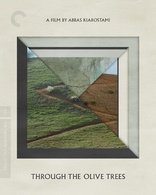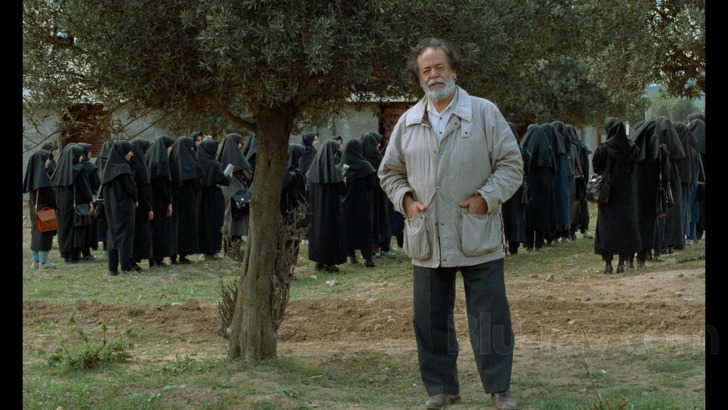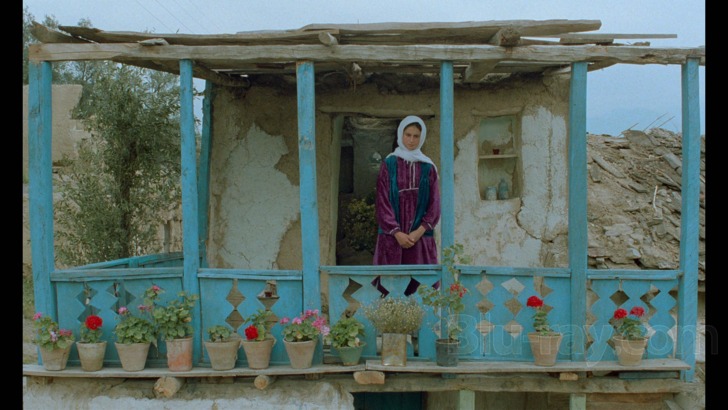Through the Olive Trees Blu-ray Movie
HomeThrough the Olive Trees Blu-ray Movie 
زیر درختان زیتون / Zire darakhatan zeytonCriterion | 1994 | 104 min | Not rated | No Release Date

Price
Movie rating
7 | / 10 |
Blu-ray rating
| Users | 0.0 | |
| Reviewer | 4.5 | |
| Overall | 4.5 |
Overview
Through the Olive Trees (1994)
An Iranian director acts as go-between when his lead actors won't work together because of cultural differences.
Director: Abbas Kiarostami| Foreign | Uncertain |
| Drama | Uncertain |
Specifications
Video
Video codec: MPEG-4 AVC
Video resolution: 1080p
Aspect ratio: 1.66:1
Original aspect ratio: 1.66:1
Audio
Persian: LPCM Mono
Subtitles
English
Discs
Blu-ray Disc
Single disc (1 BD)
Playback
Region A (locked)
Review
Rating summary
| Movie | 5.0 | |
| Video | 5.0 | |
| Audio | 4.5 | |
| Extras | 5.0 | |
| Overall | 4.5 |
Through the Olive Trees Blu-ray Movie Review
A masterful conclusion to the thematically rewarding Koker Trilogy
Reviewed by Neil Lumbard September 9, 2019The final film in Kiarostami's Koker Trilogy, Through the Olive Trees is a fascinating follow up to the magnificent And Life Goes On. This time around, Kiarostami brings the story to a complete u-turn as the film focuses on expanding upon a small sub-plot in As Life Goes On and turns events in that story into fiction, turning the previous “reality” of some of the characters from the previous film into a different approach altogether: a film-within-a-film world with another director (Mohamad Ali Keshavarz) working to direct the director (Farhad Kheradmand) featured in And Life Goes On and others. It's a brilliant concept and it plays out with great wit.
However, the central focus of this story is the newly-married characters from the feature being produced and their romantic entanglement together in reality (which is in stark contrast to their fictional selves). Hossein (Hossein Rezai) wishes nothing more than to gain the affection of his leading-lady Tahereh (Tahereh Ladanian) but he has trouble convincing her that he would make a worthwhile husband. The story is achingly heartfelt as it shows the bumbling Hossein attempting to win the affections of Tahereh. There's something charming about the way the film's final sequences unfold.

A film within a film. A director directed. Kiarostami brings magic tricks.
One of the best aspects of the story is the way it explores the philosophy of the central character. Hossein delves into his view on life and the way in which poor people and wealthy people should marry one another to “help each other out”. (Part of this is due in part to his affections for Tahereh. Though she isn't from a wealthy family, they are well-off compared to him.) There's an entire scene where he delves into this concept: the poor should marry the wealthy and homeowners should marry those who can't afford to buy a home (as he ponders who even needs a second home upon marriage). (The director, Mohamad Ali Keshavarz, offers a counter point to the argument: that removes the wealthy from being able to rent out their second home.)
There's something magnificent about how poetic Through the Olive Trees is throughout the journey. This is the work of a confident filmmaker who clearly is at the top of his game. It's a masterpiece. Though not my favorite of the three gems in the Koker Trilogy it is easily the most self-assured filmmaking in the series.
Watching a gem like this unfold feels akin to seeing a cinematic miracle occur. It makes one wonder why more films can't be as special as this one. (The reality: if everything was equal special films like this wouldn't stand out from the crowd.) Through the Olive Trees was a transcendent experience and one that left me satisfied by the open-ended conclusion. Kiarostami wants for viewers to contemplate what happens after the credits. I wouldn't have it any other way.
Through the Olive Trees Blu-ray Movie, Video Quality 

Through The Olive Trees has received a 1080p MPEG-4 AVC encoded high definition presentation in the original 1.66:1 theatrical aspect ratio. This is a superb presentation that astonishes from beginning to end. In fact, this third outing in the Koker Trilogy looks the absolute best out of the bunch. I suppose it's no surprise (this film was given a brand new 4K restoration, whereas And Life Goes On and Where Is the Friends House? each received new 2K restorations). This difference is noted in the booklet inside the set.
From Criterion: "The new digital transfer of Through the Olive Trees was created in 4K resolution on an ARRISCAN film scanner from the 35 mm original camera negative at Eclair in Vanves, France. Thousands of instances of dirt, debris, scratches, splices, and warps were manually removed using MTI Film's DRS, while Digital Vision's Phoenix was used for jitter, flicker, small dirt, grain, and noise management."
Each feature in the collection progressively looked a little bit better than the last feature (which was a rather interesting thing to find given each has a magnificent restoration): some of this aspect is no doubt due to the years of production and some to the budgets. Yet it seemed apparent to me that Through the Olive Trees looked especially magnificent: a near flawless presentation that simply radiates with its naturally filmic beauty.
This is a stunning restoration which rounds out this collection magnificently. (Though the outer cardboard box for The Koker Trilogy indicates 2K restorations for each of these features, it's worth noting the booklet correctly differentiates the restoration efforts made on both Where is the Friend's House? and As Life Goes On in contrast to the 4K scan for the final film included in the set, Through the Olive Trees.
Through the Olive Trees Blu-ray Movie, Audio Quality 

Matching the superb picture-quality is the impressive uncompressed PCM mono soundtrack. Presented in Persian with English subtitles, Through the Olive Trees has crystal clear 24 bit lossless audio that has superb dialogue reproduction. Music also sounds terrific on the release. What a beautiful and rewarding sound presentation. The film has a somewhat quiet and reserved sound design but when the film utilizes music and the natural sounds of the characters surroundings in Koker, the result is highly satisfactory. As noted in the included booklet: "Clicks, thumps, hiss, hum, and crackle were manually removed using Pro Tools HD and iZotope RX." Another first-rate effort from Criterion.
Through the Olive Trees Blu-ray Movie, Special Features and Extras 

Ahmad Kiarostami (HD, 14:12) is a personal and insightful interview with the filmmaker's son about his fathers filmmaking and approach to cinema. Perhaps one of the most interesting insights on the piece was the revelation that Kiarostami was not much of a so-called "cinephile" and mostly drew inspiration from real life for his films rather than the works of other directors. The process and style used for his films is explored with great insights (including some thoughts on the directors approach to working with children).
Jamsheed Akrami and Godfrey Cheshire (HD, 19:32) is a conversation between film scholar Jamsheed Akrami and film critic Godfrey Cheshire. The two authorities on film discuss the filmmaker's style and the question of thematic relevance to the Koker trilogy: despite the films lack of complete connective tissue story-wise, the connection of each film to the people and place of Koker makes the films feel connected to each other as if it were a trilogy (the term, coined by film critics, has been adopted as a common way to discuss the three films).
Through the Olive Trees Blu-ray Movie, Overall Score and Recommendation 

Reaching the end of Through the Olive Trees feels cathartic: the journey through the Koker Trilogy is one which will stay with me forever. There is something deeply personal about the films by the great Kiarostami. Each effort feels like a tone poem and there's a lyrical quality to the filmmaking that one doesn't experience with ordinary efforts. There's nothing ordinary here: Kiarostami is one of cinema's greatest artists and each of the films in this trilogy will leave a lasting impression. How often does one feel like they see something profound? Not often. That just makes Through the Olive Trees even more special. A masterpiece.
Similar titles
Similar titles you might also like
(Still not reliable for this title)

And Life Goes On
زندگی و دیگر هیچ / Zendegi va digar hich / Life, and Nothing More...
1992

Where Is the Friend's House?
خانه دوست کجاست / Khane-ye doust kodjast?
1987

Taste of Cherry
طعم گيلاس / Ta'm e guilass
1997

Stalker
Сталкер
1979

Through a Glass Darkly
Såsom i en spegel
1961

Wild Strawberries
Smultronstället
1957

Yi Yi
一一
2000

Summer Interlude
Sommarlek
1951

Hard to Be a God
Трудно быть Богом
2013

Scenes from a Marriage
Scener ur ett äktenskap / Television and U.S. Theatrical versions
1973

The Rite
Riten / The Ritual
1969

Kings of the Road
Im Lauf der Zeit
1976

Port of Call
Hamnstad
1948

Thirst
Törst
1949

To Joy
Till glädje
1950

The Seventh Seal 4K
Det sjunde inseglet
1957

The Silence
Tystnaden
1963

After the Rehearsal
Efter repetitionen
1984

Alice in the Cities
Alice in den Städten
1974

La Pointe Courte
1955